Contrary to popular belief, all links are not created equally.
There are definitely links out there that you don’t want to have associated with your website. These can hurt your domain authority and negatively impact your SEO ranking.
We refer to these as dangerous links.
You should never link out to dangerous links, and you want to avoid getting any backlinks from dangerous links.
But in order to make sure this doesn’t happen, you need to be able to identify dangerous links in the first place. Otherwise, you won’t know what sites you should be avoiding.
Sometimes dangerous links are glaringly obvious. But other times it’s not so straightforward. That’s what inspired us to write this guide.
We’ll give you a bunch of different examples of dangerous links so you can be fully prepared to master your link building strategy.
Blog networks
In general, you should avoid any paid links. Google refers to these as “link schemes.”
Link schemes are defined as any links that are made to manipulate the site’s ranking or page rank by violating Google’s webmaster guidelines.
Buying or selling links falls into this category. Any money, goods, or services exchanged for links must be avoided. Partner pages that are specifically designed for cross-linking and excessive link exchanging between sites is also considered a link scheme.
If you’re caught in a link scheme, you’ll be penalized by Google, and blog networks typically put you in jeopardy of these violations.
However, we’ve seen plenty of businesses that do this unintentionally. They don’t realize that they’re getting backlinks from a dangerous link. Here’s an example to show you what we mean.
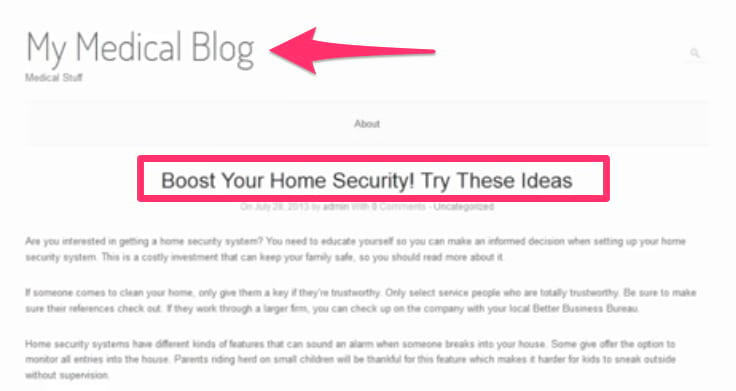
This site is called My Medical Blog. So if your company is in the medical industry, you might think this is a good site to build backlinks on. But upon further examination, you’ll see that’s not the case.
The name of the site and the subheader says that the content is supposed to be about “medical stuff” (doesn’t sound very professional).
But the title of the blog post is related to boosting your home security. Clearly, this has nothing to do with the medical field. This is a huge red flag that the website is operating a blog network.
In case you were still on the fence about this site, here’s a look at some of the other blog post titles when you keep scrolling.
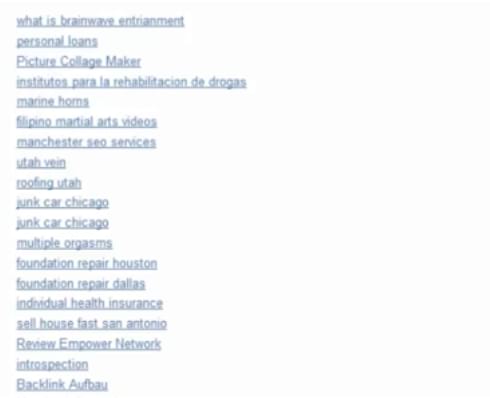
It’s just a bunch of random exact match anchor text links.
None of these topics have anything to do with each other, and they’re definitely not medically related. Links like this are listed below every single article on the site. Obviously, this is a paid link situation and a dangerous link that you’ll want to avoid at all costs.
Forum profiles
There is nothing wrong with participating in online forums and discussions. Forum marketing is a great way to network and drive traffic to your website.
We like forums because you can establish yourself as an authority figure in your industry. You can also give and get help from peers in your network. That’s why we participate in forums myself.
When you register on a forum, the platform may give you the opportunity to include a link to your website. Again, this is perfectly legitimate if you’re participating in forums and you have a few links out there on the web.
But there is a major problem if you do this at scale.
Years ago, this was a very popular SEO strategy. But now Google plays much closer attention to forum links because they tend to create a spammy link profile. You don’t want your site to get that reputation.
We strongly advise against having hundreds of links to your website in forum profiles. Doing this three, four, or even five times is fine; assuming it’s legitimate with no intentions of spam.
So when you’re evaluating forum sites for dangerous links, you should look at the list of members. If a site allows you to create an “about me” area or biography, review those profiles of other members to see if they are legit.
Here are some profiles we saw on a forum network that we were evaluating.
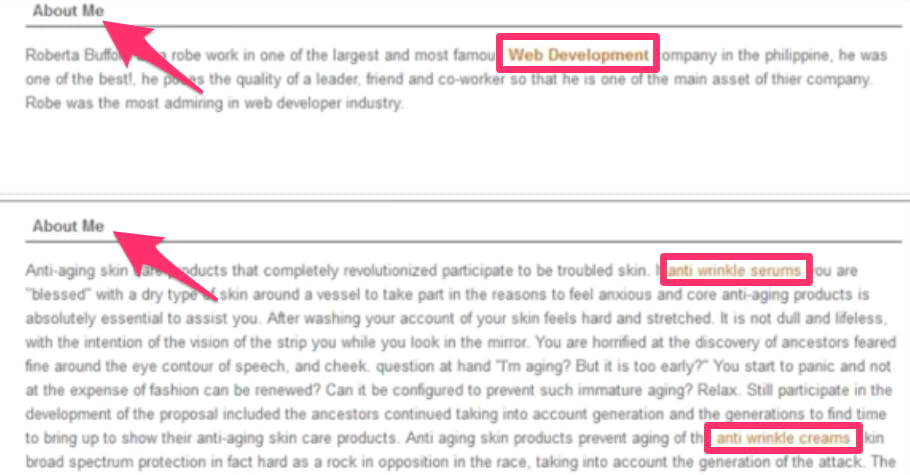
This is something that we’d consider a dangerous link.
Clearly, these are all exact match anchor text links. The profiles here have been spammed.
As we continued scrolling through more profiles, we found much more of the same pattern from other registered users. So this is obviously a low-quality site to begin with if they’re not even moderating this type of behavior.
However, there are times when this approach can be appropriate.
Let’s say you’re a web designer, so you join a web design forum to talk with other people in your industry. There’s nothing wrong with having a link to your profile here.
But if the website has been spammed at all from other irrelevant users like the example above, you don’t want your name, brand, site, or links to have an association or affiliation with the forum.
Blog comments
Blog comments can be great for your website.
Whenever you write a blog, it’s ideal if you can encourage and facilitate a discussion from your site visitors in the comments section. This is something we’d definitely encourage you to try out.
So if you’re reading a blog on another website, there’s nothing wrong with leaving a comment to voice your opinion, add some insight, and contribute to the discussion. That’s what the comments section was made for.
Although it’s no longer as effective as it used to be, you can even use blog comments to get some targeted traffic if you’re commenting on blog posts that are in your niche.
However, all too often we see comments sections that have been turned into mayhem and nothing but spam. Blog comments are not a viable link building strategy, especially if you’re using exact match anchor text.
If you’re going to leave an insightful comment on a blog, just leave your name and company name, potentially with the full URL to your site. But stay away from this approach on blogs that have already been spammed with dangerous comments.
Partner links
Partner links are a common black hat link building strategy. We briefly talked about this earlier when we were discussing paid links that go against Google’s policy.
These are usually links found in the sidebar of a website that are clearly paid.
In our experience, this gets people in big trouble because they don’t realize that what they’re doing is wrong. So many site owners think this is a legitimate way to build links because it doesn’t appear as spammy as other examples we’ve seen.
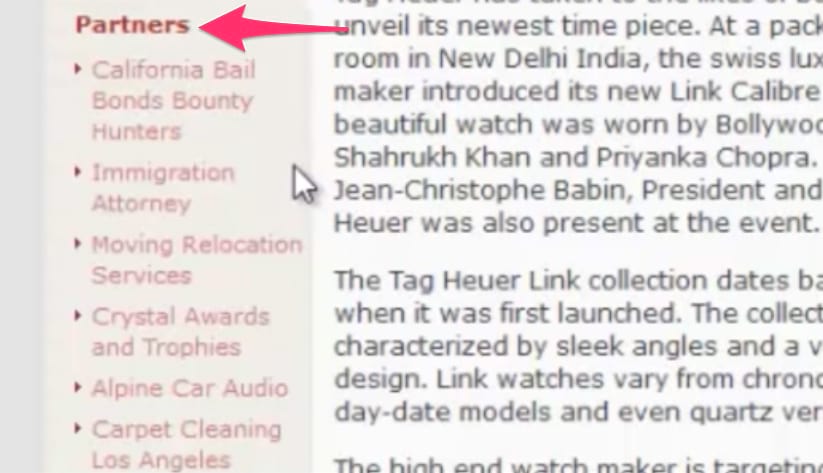
At first glance, this might seem legitimate. But this is not something you should be participating in.
As you look at the links in greater detail, it becomes more apparent that they’re paid links. Immigration attorney, carpet cleaning, bail bonds, and car audio. There is no connection between these links and none of them are related to the main website.
We would not recommend this, however, you can use partner links to drive traffic to your website as opposed to using them as an SEO strategy. Just make sure that your links are nofollow to avoid being penalized by Google.
With that said, we’d personally avoid this altogether.
Never buy any dofollow links that are on a website in a sidebar or section titled something along the lines of partners or sponsors. That will get you into trouble with Google.
It’s just not worth the risk and definitely should have no association with your link building strategy.
Forum signatures
We talked about forums earlier, but that was centered around forum profiles. Now we want to continue that discussion and talk about forum signatures.
Again, forums are a great way to drive targeted traffic to your website.
We’re not saying that you shouldn’t participate in forums. But you just need to take the right approach. Don’t join forums to build links, and don’t participate in forums that would be considered dangerous links.
Aside from forum profiles, how else can you tell if forums are dangerous?
Look at the user signatures of all posts and see what you can come up with.
Here’s an example of what you want to avoid.

As you can see, it includes exact match anchor text to a website. This is obviously very spammy. Instead, just put the name of your business, your name, or even a quick CTA.
The problem with the example that we’ve highlighted above is that once you start posting hundreds of times, that anchor is really going to mess up your overall anchor text diversity. As a result, you can be penalized by Google. You should also avoid posting on forums where you see lots of this happening.
Google and SEO aside, this approach just looks spammy. You don’t want people to see your posts and ignore them because they think you’re a spammer. It’s not good for your brand reputation, especially if you do lots of forum marketing.
Web directories
Truthfully, web directories are kind of a grey area when it comes to dangerous links. There are definitely some directories out there that provide plenty of value for link building.
But in our experience, the majority of them aren’t what you should be looking for.
When it comes to directories, you’ll only want to stick to trusted and legitimate sites. It’s also important to find directories that are related to your niche, as opposed to just being listed randomly with other irrelevant sites.
Avoid directories that aren’t household names.
Do some research. Sometimes just a few minutes browsing around the directory will be enough to tell you if it’s dangerous.
For example, check out this directory that we found.
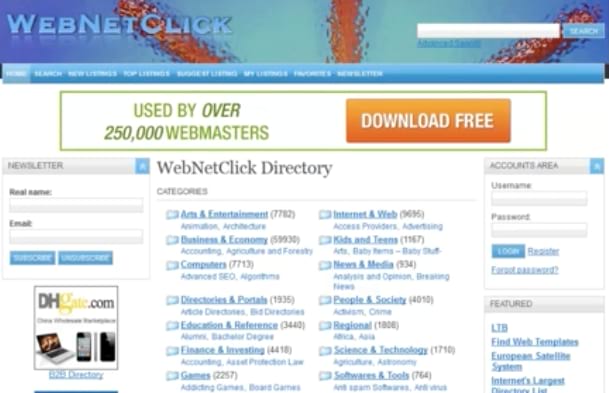
It doesn’t look like the most professional website on the planet, but at first glance, it could seem legitimate.
But let’s see what happens when you click on a category.
This is what appears under the web software section.

Yes, there’s a link for the best web hosting in there. But we also see things like “cheap prom dresses” and “wedding dresses UK” that are exact match anchors unrelated to web software, which is clearly spam.
This site is obviously just accepting payment for links and burying them anywhere. Don’t waste your time trying to build links on sites like this that won’t give you any value.
You’re much better off building quality links from resource pages as opposed to random directories.
Article directories
Article directories can be a great way to drive traffic to your website. But like some of the other tactics we talked about so far, this only works if you do it the right way.
Let’s give you an example.
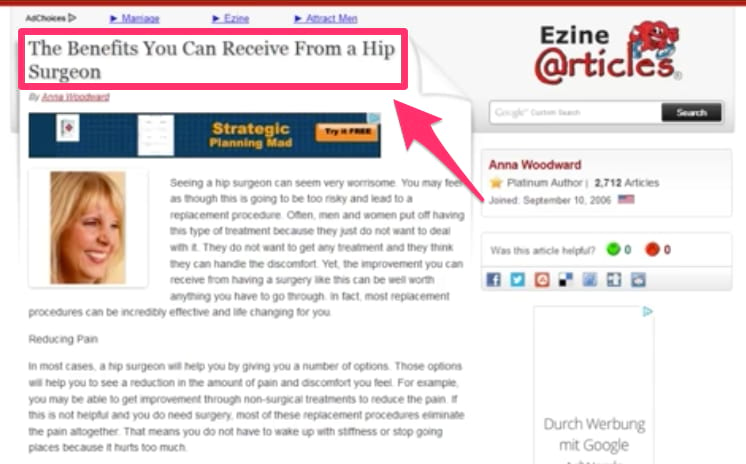
Right away you kind of get the impression that this might not be the best article in the world, but that’s not the point.
A site like this could still be a way to drive traffic to your website.
However, as you get toward the bottom of the article, here’s what you find.

There is an exact match anchor text that is spammy. The URL that was used in the next link is much better and safer to use.
You can definitely do article marketing. Just don’t spam your author or bio area, similar to what we talked about regarding forum profiles and signatures.
In general, we don’t think article directories will help you that much with SEO. But that’s not really the topic for today’s discussion, so we’ll leave that up for you to decide.
To stay on the safe side, just make sure you’re not spamming your bio or article endings. Broad URLs to your homepage are much safer than exact match anchor text if you want to avoid being considered spammy in the eyes of Google’s algorithm.
Conclusion
Backlinks great for SEO and driving targeted traffic to your website. But with that said, you never want your site associated with dangerous links.
- Blog networks
- Forum profiles
- Blog comments
- Partner links
- Forum signatures
- Web directories
- Article directories
These are all things you need to keep a close eye on to determine if a website is legitimate or dangerous. If you’re on the fence and unsure, it’s best to err on the side of caution and avoid the link altogether.
There are plenty of other safe links out there that you can use to your advantage.
